When it comes to city passes and travel cards, it’s usually fairly easy to figure out whether they would be worth it for you or not. For things like the Paris Pass or London Pass, they have a list of the most popular attractions and how much they cost, right there for you to see. The Swiss Travel Pass, however, is shrouded in mystery, or at least it was until I spent several days tracking down all of the prices and benefits.
A great many of the visitors and commenters on my popular page about where to go in Switzerland on a short visit are wondering whether the Swiss Travel Pass is a good deal. Embarrassingly, I’ve always had to answer that I found the pass too confusing to confidently advise people on. Now that has all changed, after literally days of research.
Note: This article was last updated in February, 2024.
Disclosure: This is a reader-supported website and some of the links are affiliate links where a small commission is paid to help keep this site going, but the cost to visitors is the same. The Swiss Travel Pass seems quite expensive at first, so it felt like it might be hard to get your money’s worth out of it. As it turns out, it’s pretty easy to get good value, and it’ll be a good deal for many visitors.
New in 2024
Prices increased an average of 5.9% from 2023 on the Swiss Travel Passes, but the Half Fare Card remains at CHF120, which is where it’s been for many years. Train fares in the country increased by similar percentages so the value is basically unchanged. There were no other notable changes to service or the included attractions and train routes.
>>>Buy the Swiss Travel Pass online
Where to stay in Interlaken and the Lauterbrunnen Valley
Since most people reading this will be visiting the Interlaken area and I get so many questions about it, I decided to write a detailed guide on which area to stay in while visiting this area.
>>>Where to stay in Interlaken or the Lauterbrunnen Valley in Switzerland
I included many huge photos in that post so readers will be able to get a better idea of what each place looks like and they are worth a look by itself.
Are you 100% sure where you want to go in Switzerland? This should help
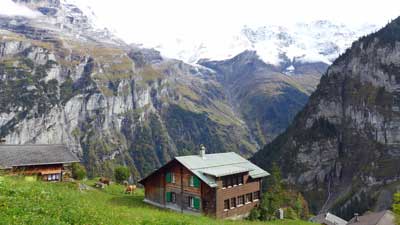
Zurich and Geneva are pleasant but dull. The good news is that Switzerland is packed with amazing sights and none of them are the big cities. If you aren’t 100% locked in yet, please read the article below and I think you’ll enjoy it.
Is the Swiss Travel Pass a good deal? Here's the short version
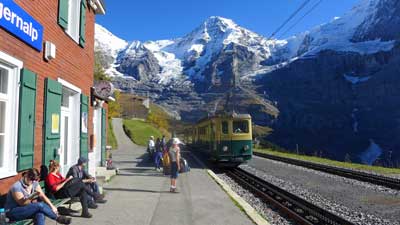
The bottom line is that the scenery, train journeys, and cable car rides in Switzerland are stunning and not found anywhere else in the world. They are also quite expensive if you pay for them one at a time. So no matter how you visit Switzerland, you are going to be paying quite a bit, or skipping the absolute best things that you’ve come there to see.
With good planning it’s quite easy to get great value out of a Swiss Travel Pass, but it might be a poor choice for those who don’t like to plan ahead. You can easily do a scenic train ride and a cable car in the same day, and still have time to do a scenic hike in the process.
First class or second class? Good news for most people
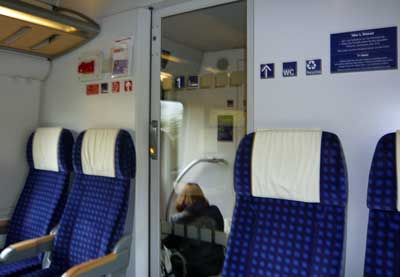
That said, Swiss Trains are literally the nicest in Europe and even the Second Class seats and carriages are nicer and roomier than trains in neighboring countries. The First Class seats are larger and nicer with only 3 across the cabin instead of 4, but honestly Second Class is perfectly comfortable for almost everyone.
Again, First Class on European trains like this is generally popular with business travelers where the company is paying and they need to get work done during the ride, and also senior citizens who don’t want to worry about a carriage full of backpackers. For most of the rest of us, Second Class is more than comfortable enough and the seat width and legroom compare to business-class airline seats. I’m a big and tall guy and I almost always travel in Second because it’s plenty comfortable enough and all the seats arrive at the same time anyway.
The longer you'll be in Switzerland, the better deal a Swiss Travel Pass will be
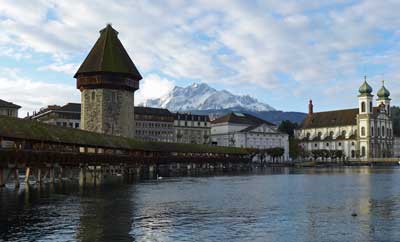
In other words, if you are staying 5 days or fewer, you have to do the math to determine your best option. But if you are spending even 6 or 7 days in Switzerland then the 6-day or 8-day Pass is almost guaranteed to be a great deal and your best choice. Once you have a Swiss Travel Pass you’ll absolutely love the ability to just hop on any train (excellent trains, always on time) and most boats and cable cars without having to worry about the cost. The per-day cost of an 8-day Pass even if you only use 6 of those days is about CHF65, and Switzerland is filled with amazing train rides and boats and cable cars that can get you that much value before noon each day.
Schilthorn (50% discount) and Jungfraujoch (25% discount) are cheaper with a Swiss Travel Pass
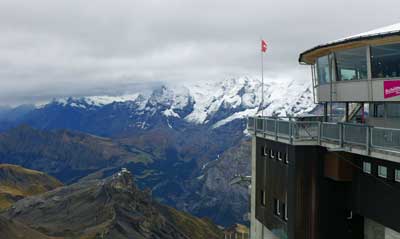
Both of those peak experiences are extraordinary and different from each other. Even so, compared to Jungfraujoch, Schilthorn is also faster and more comfortable on the way up and down. You can enjoy an excellent visit to Schilthorn in 4 hours or so (or a bit longer if you eat at the spinning Piz Gloria restaurant at the top), while a visit to Jungfraujoch requires closer to 6 hours.
NOTE: Schilthorn closes for maintenance for a week or two in late November most years.
Consider the Swiss Half-Fare Card instead
If you AREN’T going to be doing two or more of the long (and expensive) scenic train trips, you will get much better value out of the Swiss Half-Fare Card, which is explained a bit below.
Mt Rigi, near Lucerne, is 100% covered by the Swiss Travel Pass
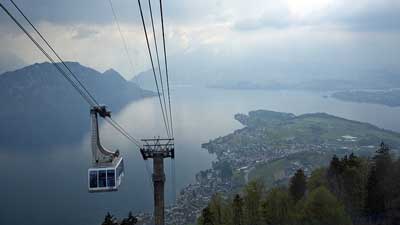
Is a Swiss Travel Pass right for you?
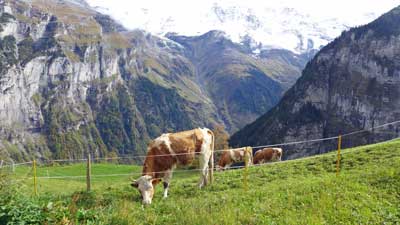
Most people only visit Switzerland for 5 or 6 days at most, so the 3-day and 4-day passes are the ones to focus on. But if you are staying for 8 days or more, those longer passes are almost certainly a great deal for you.
Long story short, if you plan on doing 2 of the more expensive scenic trains and the Jungfraujoch railway or the Schilthorn cable car, then the pass will save you money. Switzerland is expensive, but it’s worth it, and the travel pass can help make it a bit more affordable.
What the Swiss Travel Pass includes
- Free rail travel on normal trains and most scenic trains
- Discounted travel (about 50%) on popular tourist mountain trains
- Discounted travel (about 50%) on popular tourist cable cars
- Free travel on public transport in 75 towns and cities
- Free entry to around 500 museums in Switzerland
The Swiss Travel Pass covers the fare on the most popular scenic and panoramic trains. You can choose a normal seat in a regular carriage for no additional cost, but there is a supplement of CHF8 to CHF49 for a reserved seat in one of the special panorama carriages on these routes.
Prices of the 2024 Swiss Travel Pass
1st Class
- Adult 3-day Pass: CHF389
- Youth (4 to 25) 3-day Pass: 274
- Adult 4-day Pass: 469
- Youth (4 to 25) 4-day Pass: 330
- Adult 6-day Pass: 602
- Youth (4 to 25) 6-day Pass: 424
- Adult 8-day Pass: 655
- Youth (4 to 25) 8-day Pass: 469
- Adult 15-day Pass: 723
- Youth (4 to 25) 15-day Pass: 512
2nd Class
- Adult 3-day Pass: CHF244
- Youth (4 to 25) 3-day Pass: 172
- Adult 4-day Pass: 295
- Youth (16 to 25) 4-day Pass: 209
- Adult 6-day Pass: 379
- Youth (16 to 25) 6-day Pass: 268
- Adult 8-day Pass: 419
- Youth (16 to 25) 8-day Pass: 297
- Adult 15-day Pass: 459
- Youth (16 to 25) 15-day Pass: 328
Swiss Travel Pass Flex
This version costs a bit more, but you don’t have to use the travel days consecutively. It’s a great option for anyone who won’t be taking longer train rides each day.
- Adult 3 Flex days in 1 month (1st Class): CHF445
- Adult 3 Flex days in 1 month (2nd Class): 279
- Adult 4 Flex days in 1 month (1st Class): 539
- Adult 4 Flex days in 1 month (2nd Class): 339
- Adult 6 Flex days in 1 month (1st Class): 644
- Adult 6 Flex days in 1 month (2nd Class): 405
- Adult 8 Flex days in 1 month (1st Class): 697
- Adult 8 Flex days in 1 month (2nd Class): 439
- Adult 15 Flex days in 1 month (1st Class): 755
- Adult 15 Flex days in 1 month (2nd Class): 472
Where to buy the Swiss Travel Pass
The Swiss Half-Fare Card – A better option for many visitors
Far less confusing than the Swiss Travel Pass, you can instead get a Swiss Half-Fare Card, and it will be a better deal for many travelers. The price is lower and it’s much easier to do the math, and the discounts are greater on some things as well.
- Swiss Half-Fare Card for 30 days: Adults – CHF120 or US$129
What you get:
Those who buy the Swiss Half-Fare Card will get 50% discount on all trains, buses, and boats in Switzerland for up to 30 days, as well as 50% off all public transportation in 75 cities and towns.
>>>Buy the Swiss Half-Fare Card
Why the Half-Fare Card is a better deal for many
While the Swiss Travel Pass is a great deal for those doing many of the expensive scenic journeys and mountain sights within a few days, it’s not good value for those who are doing fewer of the expensive trips and/or those who are staying longer. Also, the Swiss Travel Pass only provides a 25% discount on the amazing Jungfraujoch Railway, which costs between CHF120 and CHF224 return depending on your starting point, while the Half-Fare Card provides a 50% discount.
The math is simple as well. You can just add up the cost of the trains, boats, and buses you’ll be taking while in Switzerland, and if the total is more than CHF240 or so, the Half-Fare Card will save you money.
Example itinerary:
- Zurich to Interlaken train (2nd Class): CHF50
- Schilthorn Cable Car: CHF112
- Jungfraujoch railway from Interlaken: CHF205
- Interlaken to Lucerne train (2nd Class): CHF33
- Mt Rigi roundtrip from Lucerne: CHF84
- Engelberg (near Lucerne) to Mt. Titlis Cable Car: CHF92
- Lucerne to Zurich train (2nd Class): CHF25
Total per person: CHF601
Total with Half-Fare Card (including price of card): CHF420.50
It would be tough to do all of those things in 4 days, although it is possible. If you bought a 4-day Swiss Travel Pass here is how it adds up:
4-Day Swiss Travel Pass: CHF259
Supplements for Schilthorn, Jungfraujoch, and Mt. Titlis: CHF203.25
Total cost: CHF462.25
Bottom line on the Swiss Half-Fare Card
Since the Half-Fare Card lasts 30 days and provides a larger discount on Jungfraujoch, it is better value for visitors who want to include that scenic top-of-Europe rail journey on their trip. The discounts also add up more quickly on Schilthorn and Mt. Titlis trips, just to name two examples, and you don’t have to take many longer rail journeys to get value out of the Half-Fare Card.
Swiss Saver Day Pass (A one-day unlimited travel pass)
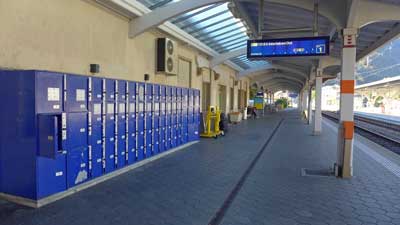
If you buy the Saver Day Pass at least 21 days in advance (and up to 60 days in advance) the 2023 cost is:
- 2nd Class (with Half Fare Card): CHF29
- 1st Class (with Half Fare Card): CHF82
- 2nd Class (with no Half Fare Card): CHF52
- 1st Class (with no Half Fare Card): CHF97
Once you research the normal cost of Swiss train fares you’ll see that the above prices are a very good deal for anyone riding more than 150 kilometers or so in a day. If you are just going, for example, from Zurich to Lucerne or Interlaken on a day, it’ll be cheaper to just buy that ticket individually. But if you are going from Geneva or Montreux to Interlaken or Lucerne then the Saver Day Pass will be much cheaper. Better still, you can use a Saver Day Pass to go from Interlaken to Geneva and back on the same day on the Goldenpass line and returning on the faster train through Bern, and it will still all be included for free.
If you don’t buy a Saver Day Pass at least 14 days in advance it’s more expensive, and if you only buy 1 to 3 days in advance it’s VERY expensive, so the key is to buy early. This is all confusing, but the Saver Day Pass should be a great option for many people only in Switzerland for one to three days.
Popular Swiss panorama scenic trains
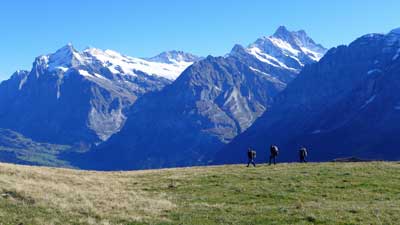
- Glacier Express
- Route: Zermatt to St. Moritz
- Train type: Panorama
- Journey time: 8 hours 3 minutes
- Distance: 291km
- 1st Class fare: CHF272
- 2nd Class fare: CHF159
- Compulsory seat reservation fee: CHF44 or 49
- Supplement for Swiss Pass holders: 13 to 33 for panorama carriage
- Bernina Express
- Route: Chur to Tirano and Lugano
- Train type: Panorama and bus
- Journey time: 4 hours 13 minutes and 3 hours 10 minutes
- Distance: 148km and 90km
- 1st Class fare: CHF113
- 2nd Class fare: CHF66
- Compulsory seat reservation fee: CHF32
- Supplement for Swiss Pass holders: 10 to 14 for panorama carriage
- GoldenPass Line
- Route: Lucerne to Montreaux
- Train type: Panorama
- Journey time: 5 hours 8 minutes
- Distance: 191 km
- Prestige Class fare: CHF131
- 1st Class fare: CHF96
- 2nd Class fare: CHF56
- Supplement for Swiss Pass holders: 8 to 15 for panorama carriage
- Gotthard Panorama Express (formerly Wilhelm Tell Express)
- Route: Lugano or Locarno to Lucerne
- Train type: Panorama and boat
- Journey time: 5 hours 21 minutes
- Distance: 182 km
- 1st Class fare: CHF164
- 2nd Class fare: CHF135
- Supplement for Swiss Pass holders: 39 to 49 for panorama carriage
- Swiss Chocolate Train
- Route: Montreux to Broc round trip
- Train type: Panorama or First Class
- Journey time: X hours X minutes
- Distance: 82 km
- 1st Class fare: CHF99
- 2nd Class fare: 89
- Supplement for Swiss Pass holders: 39
Popular Swiss scenic and theme trains
The scenic trains below are also extremely popular as sightseeing journeys rather than just as transportation, but can be used as both.
- Jungfraujoch round trip
- Route: Interlaken to Jungfraujoch
- Train type: special mountain train
- Journey time: 4 hours 41 minutes, round trip, plus time on top
- Distance: 73 km
- 1st Class fare: N/A
- 2nd Class fare: CHF224
- Supplement for Swiss Pass holders: 147 (so, a saving of CHF77)
- Gornergrat Railway
- Route: Gornergrat Railway
- Train type: Cog railway
- Journey time: 44 minutes return
- Distance: 10 km
- 1st Class fare: N/A
- 2nd Class fare: CHF90
- Supplement for Swiss Pass holders: 45
- Rigi round trip
- Route: Lucerne to Rigi
- Train type: Cog railway
- Journey time: 3 hours 25 minutes, plus time at the top
- Distance: 58 km
- 2nd Class fare: CHF78
- Supplement for Swiss Pass holders: None (this one is free with the pass)
- Mt Rigi Excursion (one-way and walk down)
- Route: Lucerne to Mt Rigi
- Train type: cogwheel train and/or cable car
- Journey time: 45 minutes up
- 1st Class fare: N/A
- 2nd Class fare: 49
- Supplement for Swiss Pass holders: 0
- Lotschberg Mountain Route and Centrovalli
- Route: Bern to Locarno
- Train type: Narrow gauge
- Journey time: 4 hours 40 minutes
- Distance: 212 km
- 1st Class fare: CHF158
- 2nd Class fare: CHF90
- Supplement for Swiss Pass holders: 5
- Jura round trip (Watchmaking Tour)
- Route: Neuchatel through Jura
- Train type: Regular
- Journey time: 3 hours 0 minutes
- Distance: 143 km
- 1st Class fare: CHF168
- 2nd Class fare: CHF108
- Supplement for Swiss Pass holders: 0
- Pre-Alpine Express
- Route: St. Gallen to Lucerne
- Train type: Regular
- Journey time: 2 hours 15 minutes
- Distance: 146 km
- 1st Class fare: CHF83
- 2nd Class fare: CHF47
- Supplement for Swiss Pass holders: 0
- Jura Foot Line
- Route: Basel to Geneva
- Train type: Regular
- Journey time: 2 hours 40 minutes
- Distance: 248 km
- 1st Class fare: CHF132
- 2nd Class fare: CHF75
- Supplement for Swiss Pass holders: 0
Popular Switzerland cable car rides
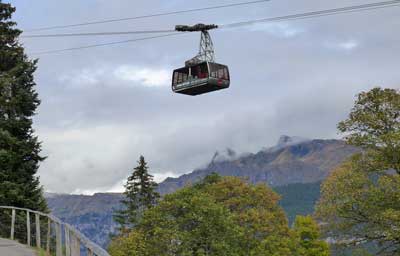
- Schilthorn
- Route: Stechelberg (Lauterbrunnen) to Schilthorn
- Train type: cable car
- Journey time: 1 hour
- 2nd Class fare: CHF108
- Supplement for Swiss Pass holders: 54
- Engelberg to Mt. Titlis cable car
- Route: Engelberg to Mt. Titlis
- Train type: cable car
- 2nd Class fare: CHF96
- Supplement for Swiss Pass holders: 46
The Swiss Travel Pass also includes free museum admission, but…
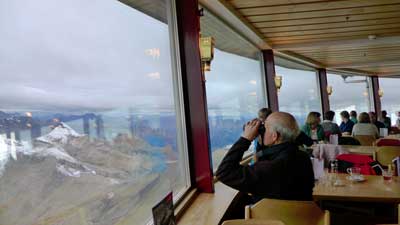
The problem is that the museums are only free on valid travel days, and almost no one would visit more than one or two museums with a Swiss Travel Pass. The trains and cable cars are so expensive that the pass gives very good value to cover those, so you don’t want to waste precious sightseeing time walking through a museum that only costs CHF10 anyway.
In other words, calculate the value of a Swiss Travel Pass on the travel savings only, and if you visit a museum here or there, then great. Most people are better off trying to squeeze in an additional train ride each day, and ignoring the museums. Switzerland is all about the outdoor scenery. As nice as the museums may be, they are not why you are there.
The pass includes free public transport in most Swiss cities
Similar to the free museum part of the offer, it’s best to ignore or minimize the value of free public transportation. It could be helpful in Zurich, but in most other Swiss tourist towns you won’t need much public transport. In fact, in Interlaken, each hotel or hostel guest automatically gets a card for free public transportation within the town (including between the two train stations).
So you might use a ride or two each day on public transport, but that won’t add up to much in terms of value of your Swiss Travel Pass.

We are planning a 2 week stay to Switzerland in June. We have already figured out the Travel pass is our best deal. I was wondering about the tours to Pilatus, Jungfrau and Schilthorn. Since we can get those tickets 50 to 25% off, how does that translate into the price of a guided tour through something like Viator?
Barbara,
I think you’d have to negotiate that with the tour company. They probably base their prices on providing your tickets, and if you can get them free or at half price they probably have a way of adjusting it. Those discounts are extremely common in Switzerland, so my guess is they have a way of dealing with it. But again, you’d have to negotiate it through the tour company. Good luck! -Roger
Hi Roger
First of all thank you for the immense insight into the Swiss pass and it’s substitutes. I wanted to understand if you could help me out for a short trip of 2 nights in Zurich in May. we would be staying near Hardbrucke for better connectivity to the city but since time is of the essence I figured renting a car would be better than taking any pass. Do you recommend that?
Another thing i wanted to ask you was if the following itinerary could be covered in a day’s time (if we consider that we take a vehicle/car for travel):-
Hardbrucke – Mt Titlis – Lauterbrunnen – Unesco biosphere – Hardbrucke .
Map timing says total driving time is 6 Hours but considering 30-45 mins stop in between and 3 hours at Mt Titlis, total time would become about 12 hours, not sure if it is possible or not.
Would appreciate any insight on this
thanks
Ashank,
Sorry for the delayed response as I was traveling myself. That sounds like quite an ambitious plan in such a short time. It’s a shame you would be staying in Zurich itself because it’s the least charming part of Switzerland and can also be slow getting in and out. Either way, I think a trip like that would be technically possible, but not really enjoyable. The Lauterbrunnen Valley is possibly the most scenic place on earth, and to drive all the way there and then have to leave after an hour seems like a wasted opportunity. I’d recommend spending most of that day in Lauterbrunnen and saving Mt Titlis for another visit. Honestly, almost any way you’d spend a few hours in Lauterbrunnen would be more dramatic than Titlis itself.
Renting a car in Switzerland can actually be a good idea for some groups because (unlike most of the rest of Europe), they have good roads and parking is available at most of the top sights. That said, I still prefer taking trains because every train ride (except for those in Zurich and its suburbs) is very scenic and if you are driving you can’t appreciate it as much. The trains mostly go faster than cars as well, and directly to the best places. I hope this helps and I’m sure you’ll have a great time however you do it. -Roger
It’s pretty wild how hard it is to navigate this – I appreciate your breakdown.
Not traveling until July but just finalized out lodging so now I am trying to sort out how to get around while we’re there. Arriving in Zurich (1 night) then spending 4 nights in Grindelwald, then 2 nights in Zermatt. I think the 8-day Swiss Travel Pass makes sense but also seems like for the time we are exploring the area around Grindelwald, a regional pass might make more sense. I feel like I need to make a spreadsheet!
Michelle,
That sounds like a great trip. I’m not sure if Switzerland realizes that their nearly infinite transportation and pass options creates so much justifiable anxiety. Without knowing more about it, I agree with you. The Bernese Oberland Pass along with a Half Fare Card might be your cheapest option, but of course it depends on how many expensive things you do while in Zermatt.
On a per-day basis, the 8-day Swiss Travel Pass is pretty cheap. I think if I were in your situation I would assume I’d buy that pass and then use the included and discounted options to plan your days. Virtually all train rides within Switzerland are very scenic, so just taking a train to, say, Bern for the day and then back again will be lovely. And that particular trip can be a great option when there is fog at the top of the mountains, as that is common even in July. There are enough cable cars and tourist trains to get great value out of a pass, without running yourselves ragged. In fact, doing a day trip from Grindelwald to Lucerne and then a boat ride (the boats leave from across from the train station) and then a walk around town and then a train back to Grindelwald would be a fantastic day. And it would all be included, of course.
I hope this helps and let me know if you have any other questions. -Roger
Getting the Swiss Travel Pass and then planning around that makes sense. I know there will still be some add ons for mountain excursions but at least they’d be discounted. I will also have two kids with me (8 & 11) so that probably makes the most sense as far as ease of traveling and flexibility.
I had already noted the day trip to Bern as a good rainy/foggy day activity based on your advice! Appreciate all the extra advice!!!
I stumbled over your site looking for information about the Lucerne area.(love it by the way, great site for information) We are planning on spending 5-6 days in the Lucerne area after a Viking Rhine cruise in June. While no definite plans at the moment we want to see a lot of area in that time. the usual tourist spots and perhaps the Interlaken area. Will the swiss trade pass safe us some money. I’m not sure if it will work on the cable cars and lake rides. Thanks Jim Curtis Denver Colorado
Jim,
If you are going to be mostly staying in or near Lucerne, it’s unlikely that a Swiss Travel Pass will save you money. It DOES work in the local cable cars and tourist railways, but those aren’t all that expensive to begin with so a Half Fare Card is probably the better option. A Swiss Travel Pass is often the best deal for those who are planning at least a couple of longer and more expensive train trips, such as the GoldenPass to Montreux. It might be best to get a Half Fare Card and then buy a Saver Day Pass for one or two days when you want to combine a boat ride on the lake with a trip up and down one of the local mountains. Let me know if you have any other questions. -Roger
Hi Roger
Just planning our first trip to Switzerland next May/June as a newly retired couple, so have flexibility & not tied to times. Have come across you website & found the advice really useful.
Our initial thoughts –
London – Paris – 2 nights
Zurich – 1 night
Zurich – Interlaken 2 nights – should this be longer ?
Interlaken – Montreux – Golden Pass – 2 nights
Montreux to Zermatt – 2 nights
Zermatt – St Moritz – Glacier Express – 1 night – ?longer
St Moritz to Lugano – Bernina Express & bus – 2 nights
Lugano – Lucerne – 2 nights
Lucerne – St Galleon – 2 nights
St Galleon – Basal – 1 night – then back to London via Cologne & Brussels
Is there anywhere that should include or miss out do you think, or stay longer in one place?
Am thinking the 15 day travel pass – would you agree or advise any different?
Apart from the Glacier & Bernina express are there any other reservations needed or can we just turn up at stations with the passes?
Any advice really appreciated, kind regards
Nicky,
This looks like an amazing trip. Most people who ask these questions are trying to figure out the most efficient way to spend 5 days or so, and in those cases I try to give advice to make sure they are spending those 5 days in the best places. But in your case you are spending plenty of time in the best places so it’s just a matter of finding the best balance. As you might have seen in the article or my article about where to go in Switzerland, it’s a very unusual country in that the cities are kind of disappointing compared to similar European cities elsewhere, and the scenery is very possibly the most dramatic and best in the world. In other words, I generally discourage people from planning too much time in the Swiss cities and I encourage them to spend more time in the small cities and the scenic areas.
That said, I think with 15 days I’d add at least one more day in the Interlaken area and specifically in the Lauterbrunnen Valley, which is the most beautiful spot in Europe. One night in Zurich is probably worthwhile (although I prefer Bern actually) and two nights in Montreux should be good. After all, spending time ONLY in small Alpine towns can also get a bit dull after a couple weeks. Basel I also find dull (my brother lives in the outskirts), but one night isn’t bad and it looks like you are covering the best places anyway.
And yes, with a Swiss Travel Pass you can just climb aboard any train and then show your pass to the ticket-checker when they come by and ask. The exceptions, as you noted, are for the specific panoramic carriages that are on some (but not all) of the named scenic routes. It’s best to reserve those well in advance because some departures only have one carriage and they can sell out early. Let me know if you have any other questions. -Roger
Thanks Roger, that is really helpful.
Now wondering if it would be better to get an Interrail Pass as travelling through additional countries, however there seems to be mixed reviews about their ease of use. Are they as readily acceptable as the Swiss Travel Pass do you know?
Nicky,
Interrail passes are (as you seem to know) the equivalent of the Eurail Passes that non-Europeans can buy. They are definitely accepted on all trains, but they usually only get you a 50% discount on cable cars and boat rides and such. The Swiss Travel Pass fully covers almost all cable cars and boat rides, along with nearly all of the private tourist trains (Interrail typically gets you 50% discount on those, such as the one from Interlaken to Lauterbrunnen and also I believe the one that gets you into Zermatt. So it’s really a matter of how much of the exclusive Swiss Travel Pass deals you’ll be using. -Roger
Comment*
Hi Roger.
I am a well-travelled Aussie and usually love planning our European vacations. However, I had almost given up and called in the professionals to help plan the Swiss segment of my upcoming trip in April/May 2023. Then I stumbled across your excellent article and was relieved to find that I am not the only one struggling with the plethora of Swiss options.
We are flying into Zurich and out of Milan, and plan to spend about 7 days in Switzerland.
Our initial thoughts are:
9, 10 Apr: Zurich, including Bernina Express
11, 12 Apr: Lucerne, including Mount Pilatus or Titlis
13 Apr: Golden Pass Train – Depart Lucerne, overnight in Montreux
14, 15 Apr: Montreux – Geneva with day trip to Annecy (France)
16 April: Geneva – Zurich – Night train to Amsterdam. (We will also be travelling by train to Paris, Milan and Venice, before renting a car for a couple of weeks)
A couple of things:
1. Which pass would you recommend? Swiss Pass, half fare pass, Global Eurail (10 day) pass or some combination of the above.
2. To have a more leisurely pace when we are in Switzerland, should I defer the Bernina Express until our return journey from Paris enroute to Milan. This would help avoid a return trip in one day when we’re in Switzerland. (We are not keen to add a further 3 hours on the bus to Lugano to facilitate the round trip via a different route). Your thoughts?
Any feedback would be greatly appreciated. Thanks in advance.
Louise,
Before we can nail down which pass you should get, I’d like to be sure that you’ve fully considered your options within Switzerland. The sort of strange and surprising thing is that the cities in Switzerland are relatively boring compared to similarly sized cities in nearby European countries, and even more importantly, the Swiss scenery is probably the most beautiful and dramatic in the entire world. Since you’ve still got plenty of time, I invite you to at least scan my other article called where to go in Switzerland. The short version is that (in my opinion), your first priority should be the Lauterbrunnen Valley near Interlaken, and your second priority should be Lucerne. It appears that you aren’t even going to the Interlaken area except for on the train from Lucerne to Montreux.
Maybe the quickest way is just to Google “Lauterbrunnen Valley” and look at the photos and even videos that come up. It’s a magical place and the two highlights are the Jungfraujoch “Top of Europe” railway and the cable car up Schilthorn, which is the mountain across the valley from Jungfrau. Neither are cheap, but with at least a Half Fare Card they are both very worthwhile.
Zurich in particular is known for bank headquarters, watch makers, and ludicrously high prices on almost everything. I’ve been to almost every corner of Europe and I almost always start with the largest city, but in Switzerland I put all of the cities (except for perhaps Bern) way down the list of the best things to see.
All of that said, if you want to stay with your original plan I think it would be a close call between the 8-day Swiss Travel Pass and the Half Fare Card. If it’s close I usually recommend going with the Pass because you’ll find other things to use it on once you are there, and the pass might even make more sense if you spend 2 or 3 days in the Lauterbrunnen Valley. Let me know if you have any other questions. -Roger
Hi Roger,
First of all, thank you for all this great information.
My family and I will be in CH from Dec 20-27. We fly into Zurich and plan to spend the night there. We head to Andermatt on the 21st just to take the Glacier Express to Zermatt which is where we are actually spending most of our time.
We plan to visit Rothorn, Gornergrat and Kleinmatterhorn (Glacier palace) from Zermatt. Finally, we’ll take the train to Geneva on the 26th, spend the night and fly out on the 27th.
I’ve been struggling to decide between the half fare card and the Swiss pass since most of our travel seems to be via cable cars and gondolas if I’m correct. Could you please provide me with any insight to help me make that decision?
Travelingcrew,
That is another tough call. I don’t have the costs of those various trips memorized so I can’t really say for sure. It looks like the Rothorn trip will be the only longer one, and the shorter ones shouldn’t be too expensive. In that case the Half Fare Card should do nicely and the full travel pass might not pay for itself. The only way to be sure would be to add them all up, but my quick guess is that the Half Fare Card is probably the better value. Have a great trip! -Roger
Thanks Roger. It was a clear decision that the half fare card was better until the 4 day promotion for 199CH came into play. I’ve re-run the numbers and I think that the promo Swiss pass is a slightly better deal money wise but the convenience more than makes up for the cost.
Travelingcrew,
That’s great! The 4-day promotion definitely helps a lot and I always encourage people to get a pass if it’s close because you’ll end up using it on more things than you have planned for until you arrive. Have a great trip. -Roger
Hi. I am Doris from Singapore.
Family of three plans to visit Switzerland, Austria n Italy. This is our first trip to Europe.
Is 14 days good enough?
What are towns should we visit? Thanks in advance.
Cheers
Doris,
My strong recommendation is to usually spend 3 nights in any city you visit. So with 14 days you really should plan on 5 cities. Venice is small enough that you can enjoy a visit in one or two nights, and you can also enjoy a city like Salzburg in 2 nights if you were in a hurry. I’d start with Rome, Florence, and Venice and plan on 7 or 8 days for those. With the remaining time you could potentially visit Vienna OR Salzburg, but if you visited both I don’t think you’d have time for Switzerland. I think Switzerland is more impressive on a first visit so I’d save Austria for a future trip.
You could visit the Interlaken area for 3 nights and Lucerne for 2 nights and spend the rest of your time in Italy. I’m happy to help you narrow down your list so let me know if you’d like more advice. -Roger
Hi Roger,
Me and my family are planning to visit Switzerland in December for 3 days.
We’re planning to visit Jungfrauzoch, lucerne and maybe taking some of scenic trains and lake cruise.
Would you recommend the travel pass or half fare card for this trip.
Thanks.
Hery,
It’s difficult to confidently answer this without more information. But from the sound of it, you will be trying to have a busy three days in Switzerland and if that is the case you’ll probably save more money with the Swiss Travel Pass. The Half Fare Card is valid for 30 days and costs the same even if you are only there for three days, so it’s ideal for slower trips. The 3-day Swiss Travel Pass costs about twice as much as the Half Fare Card, but you should easily get 3 or 4 times as much use out of it. I think if I were you I’d buy the Pass and then plan on doing as many included things as you can in those three days. Let me know if you have any other questions. -Roger
Thanks for the reply.
On the first day, we’re planning to visit Jungfrauzoch and the city nearby (interlaken etc).
Second day, we’re planning to visit Lucerne and have a city tour, and the third day maybe we will go for one of the scenic trains.
By the way, our hotel is in Zurich.
Hery,
If you are going back and forth to Zurich each day I’d definitely get a Swiss Travel Pass. Those trips going back and forth will almost pay for the whole thing. Have a great trip! -Roger
Hi Roger,
My wife and I are planning a trip in May and would like your opinion
5/13 Land in Zurich and head to Lucern
5/14 Lucern to Mt Titlis then Grindelwald
5/15 – 5/16 (In Grindelwald)Jungfrau, First, Pfingstegg)
5/17 Grindelwald to interlakken
5/18 interlakken to Basel to head to Paris
For this 6 day trip, would you recommend travel pass or half fare card?
David,
This looks really nice. First off, Grindelwald is a small village that is about 30 minutes or so by train from Interlaken, and you probably knew that. Interlaken itself is a well-worn tourist town that is pleasant and has loads of restaurants and hotels, but you can do almost anything in the area while staying in either. And most people really prefer staying in the villages, which are stunningly dotted around the Lauterbrunnen Valley. In other words, you might not need to stay in Interlaken at all, although it IS a more convenient travel hub for some things.
My hunch is that the Half Fare Card would be your best option since you aren’t planning many long train trips or included mountain excursions. That said, it’s worth adding them up and checking yourself. In some cases you can get “supersaver” train fares that can be half or less the normal price, and if any of those is available the Pass is less valuable. I hope this helps. Let me know if you have any other questions. -Roger